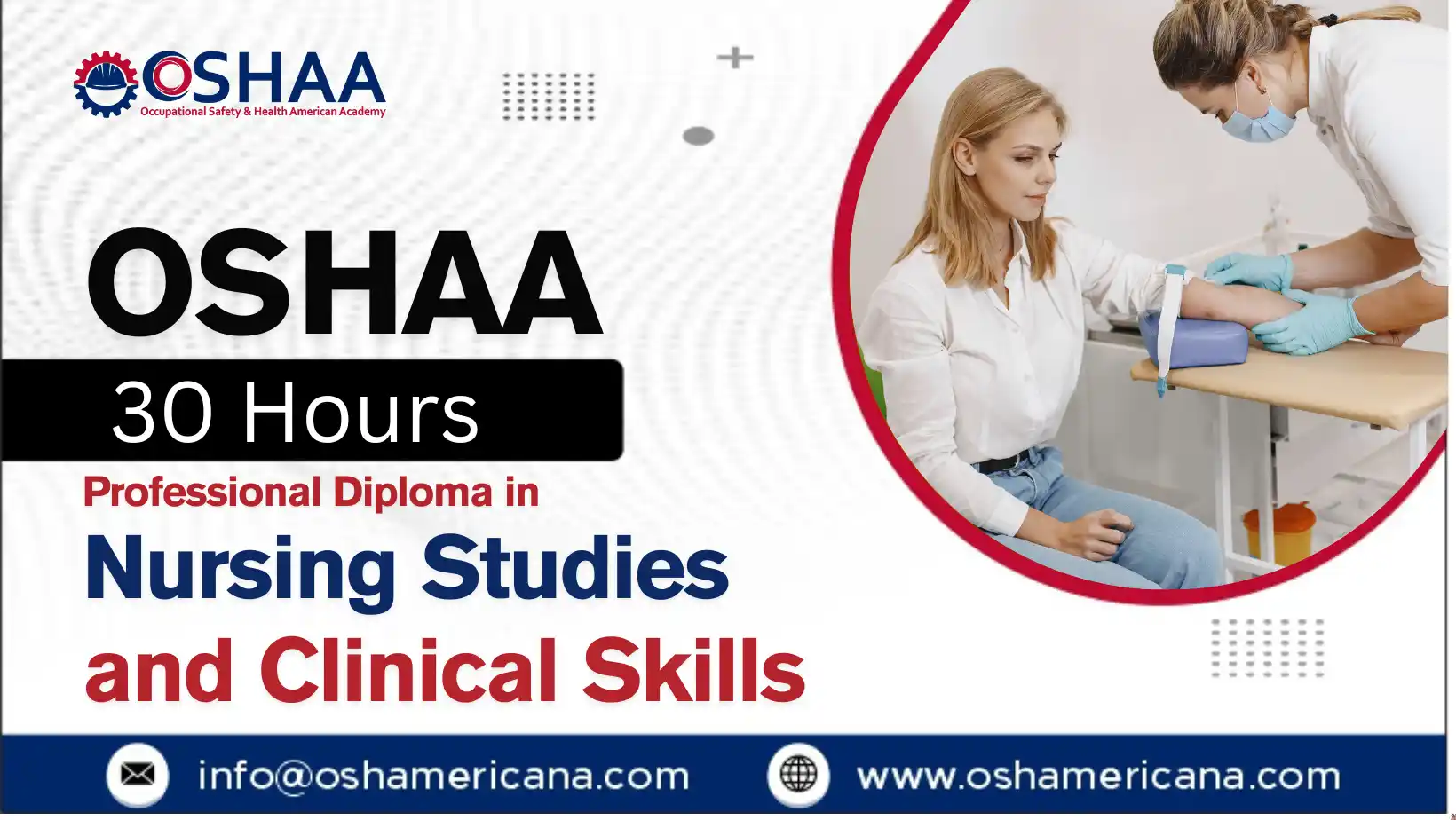The OSHAA 30-Hours Diploma in Nursing Studies and Clinical Skills is a comprehensive professional qualification tailored for healthcare practitioners seeking to enhance their clinical expertise and nursing knowledge. This diploma equips participants with essential skills and theoretical understanding necessary to provide high-quality patient care in a variety of healthcare settings.
Designed in accordance with UK professional standards, the course blends foundational nursing concepts with practical clinical training. Participants gain a robust grounding in nursing fundamentals, including patient assessment, hygiene management, medication administration, and infection control. The programme emphasises evidence-based practice, ensuring that participants are well-prepared to deliver safe and effective care aligned with the latest healthcare guidelines.
This diploma is particularly valuable for healthcare workers aiming to progress their careers, support multidisciplinary teams, or transition into more specialised nursing roles. By completing the OSHAA 30-Hours Diploma in Nursing Studies and Clinical Skills, participants demonstrate a commitment to professional development and patient-centred care.
Accredited by OSHAA, the diploma meets recognised standards that enhance employability and credibility within the healthcare sector. Participants benefit from structured learning delivered by experienced practitioners, alongside practical assessments that reinforce competence and readiness for clinical practice.
OSHAA 30-Hours Diploma in Nursing Studies and Clinical Skills
Study Units
Learning Outcomes
Fundamentals of Nursing and Patient Care (3 Hours)
- Understand the core principles of nursing and patient-centred care
- Demonstrate basic nursing skills required for daily patient support
- Apply hygiene and comfort measures to promote patient wellbeing
- Recognise the importance of empathy and professionalism in nursing practice
Anatomy and Physiology for Nursing Practice (4 Hours)
- Describe key anatomical structures and physiological systems relevant to nursing
- Explain how body systems interact to maintain health
- Identify common signs and symptoms related to system dysfunction
- Apply anatomical knowledge to inform safe and effective nursing interventions
Communication Skills in Healthcare Settings (3 Hours)
- Develop effective verbal and non-verbal communication techniques with patients and colleagues
- Demonstrate active listening and empathetic engagement
- Navigate challenging conversations with sensitivity and professionalism
- Utilise clear documentation and reporting methods in clinical practice
Infection Prevention and Control (5 Hours)
- Understand the principles of infection transmission and prevention
- Apply standard precautions and infection control protocols correctly
- Identify risks and implement measures to reduce healthcare-associated infections
- Promote patient safety through hygiene and environmental controls
Medication Administration and Safety (6 Hours)
- Demonstrate knowledge of common medication types, uses, and side effects
- Apply the ‘five rights’ of medication administration to ensure patient safety
- Recognise and respond to adverse drug reactions and errors
- Maintain accurate records and comply with legal and ethical standards
Vital Signs Monitoring and Patient Assessment (3 Hours)
- Accurately measure and interpret vital signs, including temperature, pulse, respiration, and blood pressure
- Conduct comprehensive patient assessments to identify changes in condition
- Use assessment findings to inform care planning and clinical decisions
- Document and communicate assessment outcomes effectively
Wound Care and Management (3 Hours)
- Identify different types of wounds and appropriate treatment methods
- Perform wound cleaning, dressing, and monitoring safely and effectively
- Recognise signs of infection and complications in wound healing
- Educate patients on wound care and prevention strategies
Clinical Procedures and Emergency Response (3 Hours)
- Perform basic clinical procedures with confidence and adherence to protocols
- Respond effectively to common medical emergencies and urgent care situations
- Understand the roles and responsibilities during emergency interventions
- Apply critical thinking skills to ensure patient safety under pressure
Course Benefits – OSHAA 30-Hours Diploma in Nursing Studies and Clinical Skills
- Provides participants with essential nursing knowledge and practical clinical skills to enhance patient care quality.
- Improves confidence in performing a wide range of nursing procedures and emergency responses safely and effectively.
- Equips participants with up-to-date understanding of infection prevention and medication administration best practices.
- Enhances communication skills crucial for building trust and ensuring clear interactions with patients and healthcare teams.
- Supports career progression by meeting recognised professional standards and accreditation requirements.
- Fosters critical thinking and decision-making abilities necessary for responsive and ethical nursing practice.
- Enables participants to contribute positively to patient safety, wellbeing, and overall healthcare outcomes.
- Prepares participants to work competently in diverse clinical environments, supporting multidisciplinary collaboration.
- Promotes adherence to legal, ethical, and professional responsibilities in nursing practice.
- Offers a flexible, focused learning experience that balances theory with practical application for immediate workplace relevance.
The OSHAA 30-Hours Diploma in Nursing Studies and Clinical Skills is designed for individuals working in or aspiring to enter the healthcare sector who seek to strengthen their nursing knowledge and clinical capabilities. It is especially suited to:
- Healthcare support workers and assistants aiming to develop foundational nursing skills
- Aspiring nurses preparing for entry into formal nursing education or training pathways
- Caregivers and community health workers looking to enhance their clinical competence
- International healthcare professionals seeking to align with UK healthcare standards
- Staff in residential or domiciliary care settings responsible for direct patient care
- Professionals in allied health roles who wish to broaden their practical understanding of nursing procedures
This course is ideal for participants committed to providing safe, compassionate, and effective care, and who wish to progress their careers within nursing and clinical practice environments.







